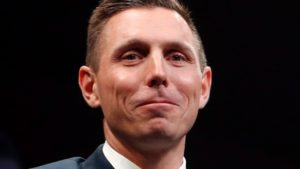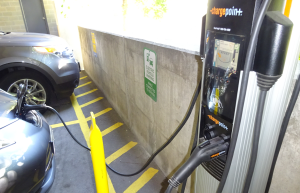February 17th, 2017
BURLINGTON, ON
Patrick Brown has put the ‘Progressive’ back into the Ontario PC party, as he gears up to give Kathleen Wynne a run for her money in the next provincial election in 2018. His mission is to move his party back to where it was before Tim Hudak took it on a wild joy ride that ultimately alienated the voters.
He acknowledges that climate change is real, is caused by humans, and he is in favour of a provincial carbon tax to help mitigate it.
Brown sounds like he’d adopt the B.C. carbon tax model if he got a chance. B.C.’s carbon tax increases over time and is intended to be revenue-neutral since income taxes have already been correspondingly reduced. Not everyone in his own party agrees with him on the idea of a carbon tax though. Perhaps that has something to with it being federal Liberal policy.
Brown opposes Premier Kathleen Wynne’s more complicated ‘cap and trade’ approach to carbon pricing/taxation. Implemented this year, there is an annual provincial greenhouse gas emissions (GHG) cap, which declines every year in line with Canada’s strategy on climate change. All large emitters must buy GHG allowances annually to operate their businesses. As we’ve already seen at the gas pumps, the oil companies and utilities will pass much of the cost of the allowances onto their customers, much like the B.C. carbon tax does.
The big difference with Ontario’s system is that the price of carbon here eventually gets determined in the market place by the buyers and sellers of allowances. This will eventually take place through an auction, rather than arbitrarily by government decree. It is conceivable in Ontario, though perhaps unimaginable, that the price of carbon could be lower in some future year, because of lower demand for allowances relative to the annual cap – something that wouldn’t ever happen with a flat carbon tax.
A second difference is that Ontario’s system is not intended to be revenue-neutral. The provincial government actually intends to spend much of the proceeds from allowance sales on transit infrastructure and for subsidies to business and consumers to assist them to adopt low carbon technologies, like electric vehicles. The provincial folks feel that is a more effective way to help consumers reduce their carbon footprint, rather than simply lowering their income taxes.
Ontario’s cap and trade will also include provisions for smaller entities to create emission credits, also called offsets, and sell these in the market place alongside allowances. For example a hog farmer could convert methane emissions (~30 times more potent that CO2) into useable energy, thereby reducing those emissions and offsetting his/her normal electricity or heating requirements. Being able to sell carbon credits into the market will provide an additional incentive to spur innovation and help pay for the costs of the technology.
Finally since cap and trade is a market instrument it requires a large number of buyers and sellers of GHG allowances and credits to work efficiently. So initially Ontario’s program will be integrated with that of California and Quebec, though other provinces and states may join later. A common trading registry and on-line format will be available for all participants in the cap and trade system.
The whole Ontario approach is complex, but no more complex than what we already see with our security exchanges, trading derivatives, hedge funds, etc. And carbon emissions trading schemes do work, as New Zealand, Japan and Europe can attest, though not always without some warts or hiccups. Emissions trading was actually invented by a University of Toronto economist, John Dales in 1968, though the idea that pollution can be monetized goes back much further in economic history.
The US acid rain cap and trade program is perhaps one of the best examples of the effectiveness of that market-based approach. Even the Harris/Eves government ran a small trading program to reduce nitrogen and sulphur emissions from the former coal-fired electricity plants.
The B.C. carbon tax, Canada’s first, received glowing praise for seeming to reduce GHG emissions during Canada’s last recession. But it has failed to do so once the economy rebounded. Since there is no cap on emissions, those who complain that it is just another tax are right. And there is no guarantee that the federal GHG reduction targets, which the former Harper government established and which the Trudeau government has since adopted, will ever be met.
Another negative is that, like any other sales tax, carbon taxes are regressive. Revenue neutrality just means there is a re-distribution of income – a reverse Robin Hood effect – giving the extra money the poorer folks paid to fill their gas tanks to those better off through their income tax reductions. Ontario’s system will still hurt the poor but at least there should be tangible alternatives for them to access lower carbon technology, including, hopefully, less costly transit.
Mr. Brown is certainly on the right track in telling his party to get behind the climate change struggle. He just needs to put politics behind him, listen to the business community and think through on the advantages of the cap and trade program Ontario has just started to implement. And while taking the tarnish off the ‘P’ in his party’s name, he should recall that there is no shame in adopting somebody else’s good idea, but it would be a shame to change just for the sake of change.
 Ray Rivers writes weekly on both federal and provincial politics, applying his more than 25 years as a federal bureaucrat to his thinking. Rivers was a candidate for provincial office in Burlington in 1995. He was the founder of the Burlington citizen committee on sustainability at a time when climate warming was a hotly debated subject. Tweet @rayzrivers
Ray Rivers writes weekly on both federal and provincial politics, applying his more than 25 years as a federal bureaucrat to his thinking. Rivers was a candidate for provincial office in Burlington in 1995. He was the founder of the Burlington citizen committee on sustainability at a time when climate warming was a hotly debated subject. Tweet @rayzrivers
Background links:
Patrick Brown – B.C. Carbon Tax – Federal Position –
Climate Deniers – GHG – Canada’s Strategy – What is Cap and Trade –























All very interesting. How do we determine what is fake news? For medical stuff I look to see sites that are not advertising anything, are associated with some higher learning medical institute and then I seek 3 or 4 similar pieces of information. For any medical question the amount of advertising is overwhelming and then the nutbar sites dominate. Fortunately, for more general items the CBC, Globe and mail, New York Times, Washington Post still have good investigative journalists who delve into things and will make use of verifiable scientific information. Again, please apply the multiple source method above with an open mind. By the way a skeptic is not someone who will not believe anything – rather, the term pertains to someone who demands evidence. And shouldn’t we all do that? Unfortunately, many folks today are so confused they think that if they find a few sites that harmonize with their initial misguided notions then they must be true – for example the anti-vaxxers.
So what is the temperature in Burlington these days? Oh, record highs again. Now a few record highs may not signify global warming but when the models are backed up with scientific observations of the effect of carbon dioxide more than 100 years ago you have to admit that there could be a threat. So over the last 100 years we are burning carbon stored over billions of years and we are just going to get away with it because we would like it that way? Yes, there are lots of folks who think they will endure in a nice afterlife and there is no problem – unfortunately, wishful thinking solves nothing.
I agree with John, the media are the bearers of fake news. So much so in fact that I have to read online papers from around the world just to get a somewhat truer story. Governments and their agencies are also guilty of bending statistics and in a lot of cases down right lying to the general public. Its fascinating watching Donald Trump being vilified by groups opposed to his election, also Britain’s democratic Brexit referendum. France, Germany the list goes on and on.
What to believe, Global warming sounds believable, but why don’t I believe it. Why do I get the feeling that we are being hoodwinked. The media should be fined for each fake story it is their duty to investigate the story not just parrot some online blog.
For a long time politicians were reluctant to impose taxes on people to ‘save the planet’ because they realized that there was no way they could avoid crippling the economy to achieve that goal. These carbon taxing schemes and ‘green energy’ expenditures only make sense if you really believe the planet is doomed from increasing carbon. You have to drink the Kool-Aid first before you are asked to pay for it.
According to Global News there are nearly 600,000 households in the province that are in arrears in their Hydro payments:
https://globalnews.ca/news/2888669/new-data-highlights-hydro-affordability-crisis-for-rural-ontario/
The Energy Minister has just instructed hydro companies not to shut off the electricity for those households who cannot afford to pay their bills estimated at 6,600. Hydro costs are escalating through the roof. The price of electricity is 3 times what it is in Manitoba, twice what it is in Quebec.
The province is awash in debt. The estimate now is that there is no way the province’s budget will be balanced much before 2025. The number of businesses closing and moving out of Ontario is alarming.
The United States is looking at streamlining their individual and corporate tax structure to make it more advantageous for companies to relocate south of the border.
Given the preceding, how does a carbon tax superimposed upon existing individuals and companies on virtually everything they purchase or use with no offsetting reduction make sense?
I would rather the government tax products at point of purchase with a differential sales tax to discourage the purchase of inefficient products. Someone who purchases a gas-guzzling Land Rover should pay substantially more tax than someone who buys a hybrid or a sub-compact. Taxing both products at the same rate sends the wrong messaging.
As Brian has accurately indicated, this isn’t the Bahamas, and homes need to be heated. It’s not as if we have a choice in the matter.
The whole idea of a Carbon Tax is idiotic. When you break it down it really comes down to ‘we’re going to make using energy so expensive that people will have to cut back or find a way to be cleaner or go out of business’.
Should we be looking to pollute less? Of course we should. There should be tax incentives for producing clean technologies, and we should explore as many energy alternatives as possible, but we shouldn’t be artificially charging more for energy when other sources are not economically viable. People love to talk about Wind and Solar but neither can even close to provide base load power, and neither are terribly effective at providing supplemental power to the grid either.
While BC’s idea of a revenue neutral carbon tax is an ok one, you can already see that with the latest numbers, the tax is no longer Revenue neutral. Unless there is a specific law in place to guarantee the government doesn’t raid the tax funds, this is ripe for abuse, and is just another tax.
Don’t even get me started on the Cap and Trade fiasco. You mentioned the Stock Market, not even realizing what kind of abuses, insider trading, back room favours, and legitimized gambling that goes on there. Is that the way we want to treat our emissions?
Canada is cold in the winter, warm in the summer, and needs to use energy. We have plenty of green space and trees which makes us carbon neutral. No need to tax ourselves poor and go into energy poverty just to that we can brag at climate conferences.